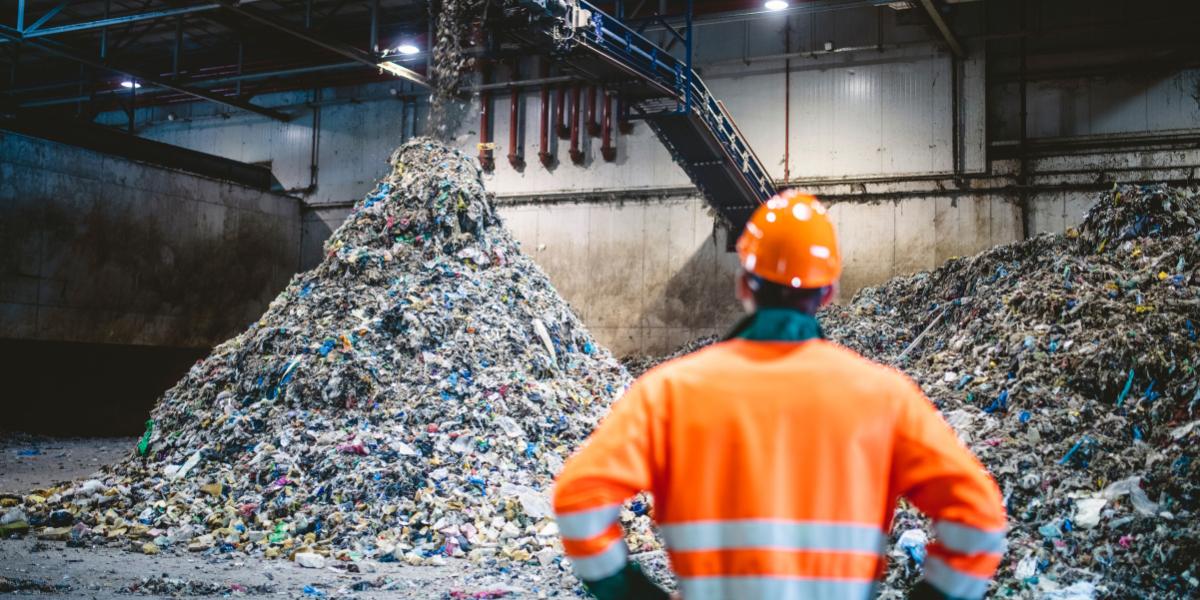Waste management is a critical driver of economic activity that extends far beyond simply dealing with waste disposal.
It touches on job creation, cost savings for businesses, public health improvement, international trade, and environmental sustainability.
Efficient waste management systems can stimulate economic growth, support innovation, and reduce environmental risks, all while conserving valuable resources.
Here’s an in-depth exploration of how does waste management affects the economy:
Job Creation and Economic Growth
One of the most direct economic benefits of waste management is its capacity to generate employment.
Waste management creates a broad spectrum of jobs across industries that include:
Waste Collection and Transport: Municipal and private waste collection services employ drivers, laborers, and logistics managers who ensure efficient and timely removal of waste from residential, commercial, and industrial areas.
Recycling and Sorting Facilities: Workers in recycling facilities are responsible for sorting and processing recyclable materials such as plastics, metals, paper, and glass. These facilities support thousands of jobs and ensure that valuable materials are returned to the supply chain.
Waste-to-Energy Plants: Engineers, technicians, and maintenance workers are needed to operate energy recovery plants that convert waste into usable energy, reducing the reliance on fossil fuels.
Circular Economy Enterprises: New business models, such as repair, reuse, upcycling, and refurbishment industries, have sprung up to transform discarded items into new products. These businesses not only reduce waste but also create sustainable jobs and economic opportunities.
Waste management-related jobs span different skill levels, from manual labor to highly specialized engineering roles, making it an inclusive sector that offers opportunities for a wide range of workers.
By creating employment, waste management boosts local economies, improves household incomes, and reduces unemployment rates.
In some regions, waste management is a vital sector driving community development and growth.

Cost Savings Through Resource Recovery
Effective waste management also leads to significant cost savings for businesses, primarily through the recovery and reuse of materials.
Recycling helps industries lower production costs by reducing their dependence on expensive raw materials.
Key examples include:
Recycling Metals: The recycling of metals like aluminum, copper, and steel is far less energy-intensive compared to extracting and refining raw ore.
Recycling aluminum, for example, uses up to 95% less energy than making new aluminum from bauxite ore. This not only helps manufacturers save money but also leads to lower prices for consumers.
Plastic Reuse in Packaging: By reusing plastics and other materials in packaging and manufacturing, companies can cut down production costs, which leads to more affordable products for consumers.
Composting in Agriculture: Organic waste can be composted and turned into nutrient-rich soil, reducing the need for chemical fertilizers. This saves money for farmers and promotes more sustainable agricultural practices, creating a ripple effect throughout the agricultural economy.
These resource recovery efforts help reduce operational costs across industries, boosting profitability and competitiveness on a global scale.
In addition, businesses that adopt sustainable waste management practices often improve their brand image, attracting eco-conscious consumers and investors.
Utilizing dumpster rentals in Hurst can help businesses streamline waste disposal and reduce costs.

Public Health Improvement and Cost Reduction
Improper waste management can pose significant risks to public health, leading to diseases and pollution-related illnesses.
Conversely, effective waste management improves public health, which in turn reduces the strain on healthcare systems and boosts worker productivity. This is accomplished through:
Improper waste management can result in water contamination, air pollution, and the spread of diseases through pests such as rats, mosquitoes, and flies.
This can increase the prevalence of diseases such as malaria, cholera, and respiratory illnesses. Proper waste management systems prevent these issues by safely disposing of waste and minimizing environmental hazards.
Air and Water Quality Improvement: Efficient waste management, including the treatment of hazardous waste and organic materials, enhances air and water quality. This reduces the incidence of respiratory and waterborne illnesses, leading to a healthier population with lower healthcare costs.
Urban Livability and Environmental Cleanliness: Cities and towns with effective waste management systems experience cleaner environments. This improves the quality of life for residents and enhances the appeal of these areas for tourists and businesses. Cleaner environments also lead to higher property values and increased investment.
In this way, responsible waste management not only protects public health but also cuts down healthcare costs and contributes to a more productive, healthier workforce.
By utilizing services like those in Denton, communities can better manage waste and enhance public health outcomes.

Boosting International Trade and Innovation in Green Markets
Waste management has an international dimension, influencing global trade flows and technological advancements.
Countries with robust waste management systems are able to capitalize on international markets for recyclable materials and green technology. Examples include:
Exports of Recyclable Materials: Countries with advanced waste processing capabilities, like the U.S., European Union members, and Japan, export vast quantities of scrap materials—such as metals, plastics, and paper—to nations with large recycling industries, such as China and India. These exports support global recycling efforts and reduce the demand for virgin raw materials.
Green Technology Innovation: Waste management drives innovation in green technology, including advancements in biodegradable materials, efficient recycling systems, and waste-to-energy technologies. These innovations create new products and services that are in demand worldwide. Companies that develop cutting-edge recycling or waste treatment technologies can export their products globally, generating revenue and driving economic growth.
International markets for recyclable materials and green technology inject billions of dollars into the global economy, and developing nations can benefit by positioning themselves as key players in the global recycling and renewable energy supply chains.
Local dumpster rental services, such as those in Saginaw, contribute to efficient waste handling, supporting these global efforts.

Reducing Environmental and Economic Risks
Mismanaged waste poses severe risks to both the environment and the economy, causing long-term damage that can hurt industries such as agriculture, fishing, and tourism.
The economic risks of poor waste management include:
Ecosystem Damage: When waste pollutes ecosystems, it harms biodiversity and degrades natural resources like forests, oceans, and rivers. This reduces the availability of these resources for industries that depend on them, such as farming, fishing, and tourism.
Climate Change Acceleration: Landfills are a major source of methane, a potent greenhouse gas that contributes to climate change. Improper waste management, such as the uncontrolled burning of waste, exacerbates the emission of harmful gases, increasing the frequency and intensity of natural disasters like floods, droughts, and hurricanes.
Rising Insurance and Disaster Recovery Costs: As climate change-related disasters become more common, insurance premiums rise, and governments face higher costs for disaster recovery. The economic impact of these disasters is significant, with businesses and communities experiencing disruptions, property damage, and revenue losses.
Proper waste management practices, such as recycling, composting, and waste-to-energy systems, help reduce environmental risks and protect the economy from the high costs associated with environmental damage.
Supporting Sustainable Development and the Circular Economy
Waste management is central to the transition towards a circular economy—a model that seeks to minimize waste by keeping resources in use for as long as possible. This creates a host of economic benefits, including:
Extending Product Life Cycles: Repairing, refurbishing, and remanufacturing products reduce the need for new resources, saving money for businesses and consumers alike. This promotes a more resource-efficient economy.
Eco-Innovation and Business Opportunities: Waste management drives innovation as companies develop new ways to reduce waste and create eco-friendly products. Businesses that invest in sustainable practices gain a competitive advantage in a marketplace increasingly shaped by environmentally conscious consumers.
Attracting Investment: Companies that prioritize environmental, social, and governance (ESG) principles are more likely to attract investment from funds that focus on sustainability. These investments support long-term growth and encourage businesses to continue adopting greener practices.
By supporting the principles of sustainable development, waste management ensures that resources are conserved for future generations while driving economic resilience in a world facing resource constraints.
FAQs:
How does waste management create jobs?
Waste management plays a crucial role in job creation across various industries, including waste collection, recycling, energy recovery, and green technologies.
It also supports the growth of emerging sectors such as repair, reuse, and upcycling, fostering economic development at both local and global levels.
Can businesses save money through waste management?
Absolutely! Waste management helps businesses cut costs by encouraging the recycling and reuse of materials, which reduces reliance on expensive raw material extraction.
For example, recycling aluminum uses significantly less energy compared to producing it from scratch, allowing businesses to boost profitability while minimizing expenses.
How does waste management contribute to public health improvement?
By reducing pollution, controlling disease vectors, and improving air and water quality, effective waste management promotes healthier communities.
This, in turn, leads to lower healthcare costs and a more productive workforce, creating a positive ripple effect on the overall economy.
What impact does waste management have on international trade?
Countries with advanced waste management systems can tap into the global market for recyclable materials like metals and plastics. Furthermore, innovations in waste management technologies open up new international business opportunities, driving exports and fueling economic growth.
What are the economic consequences of mismanaged waste?
Mismanagement of waste leads to environmental degradation, higher public health expenses, and exacerbates climate change.
These impacts harm key industries such as tourism, agriculture, and fisheries, while also increasing insurance premiums and recovery costs following natural disasters.
How does waste management support the circular economy?
Waste management is integral to the circular economy, which focuses on keeping resources in use for as long as possible.
By recycling, repairing, and remanufacturing products, businesses reduce their dependence on virgin materials, driving economic growth while promoting sustainability.
How does waste management contribute to the fight against climate change?
Efficient waste management helps mitigate climate change by reducing greenhouse gas emissions.
Diverting organic waste from landfills and lowering the energy required to produce new materials are key strategies, with recycling and composting playing significant roles in cutting methane emissions.
Can waste management stimulate local economies?
Yes! Waste management generates jobs, attracts environmentally conscious businesses, and improves the quality of life in communities.
Clean cities with well-managed waste systems see higher property values, more tourism, and increased business investments, driving local economic prosperity.
Conclusion:
Waste management plays a vital role in shaping our economy. Touching on everything from job creation and cost savings to public health, international trade, and sustainable development.
It goes beyond merely reducing waste. Effective waste management systems unlock new economic opportunities, preserve precious resources, and enhance community well-being.
By championing practices such as recycling, resource recovery, and waste-to-energy initiatives, economies can ignite growth, reduce environmental risks, and inspire innovation.
In a world where resources are becoming increasingly limited, responsible waste management stands as a key pillar of sustainable economic resilience, ensuring a thriving future for both our planet and our economy.
